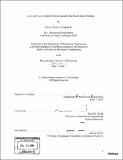Cycle-to-cycle control of reconfigurable die sheet metal forming
Author(s)
Vaughan, Chester Dewey
DownloadFull printable version (7.844Mb)
Other Contributors
Massachusetts Institute of Technology. Dept. of Mechanical Engineering.
Advisor
David E. Hardt.
Terms of use
Metadata
Show full item recordAbstract
This research addresses cycle to cycle control as applied to a sheet metal stretch forming process. More specifically, it attempts to validate the use of cycle to cycle (CtC) control for a multiple input-multiple output process. The work presented in this thesis attempts to answer some basic manufacturing questions. The first is, "Can a multivariable discrete system control theory be used to model a sheet metal shape control process?" The second question is, "Does such a "cycle to cycle control system provide a significant improvement over the present industry standard control methods". To address these questions, CtC control methods are applied to a reconfigurable die stretch forming process. The theoretical foundation of the stretch forming process is presented. Several open and closed loop control methods are discussed. A methodology for evaluating the part quality is defined in terms of the process mean shift and variance. The system dynamics are presented in terms of unwanted process disturbances. In-depth experiments are then performed to quantify the process performance under CtC control. The CtC process yield is compared the process yield of an identical process under open loop control using the Expected Quality Loss Function. It is shown that implementation of the reconfigurable die under CtC control eliminates the process mean shift but increases the part variation. It is also shown that CtC control produces the highest yield of acceptable parts.
Description
Thesis (S.M.)--Massachusetts Institute of Technology, Dept. of Mechanical Engineering, 2004. Includes bibliographical references (leaves 85-86).
Date issued
2004Department
Massachusetts Institute of Technology. Department of Mechanical EngineeringPublisher
Massachusetts Institute of Technology
Keywords
Mechanical Engineering.